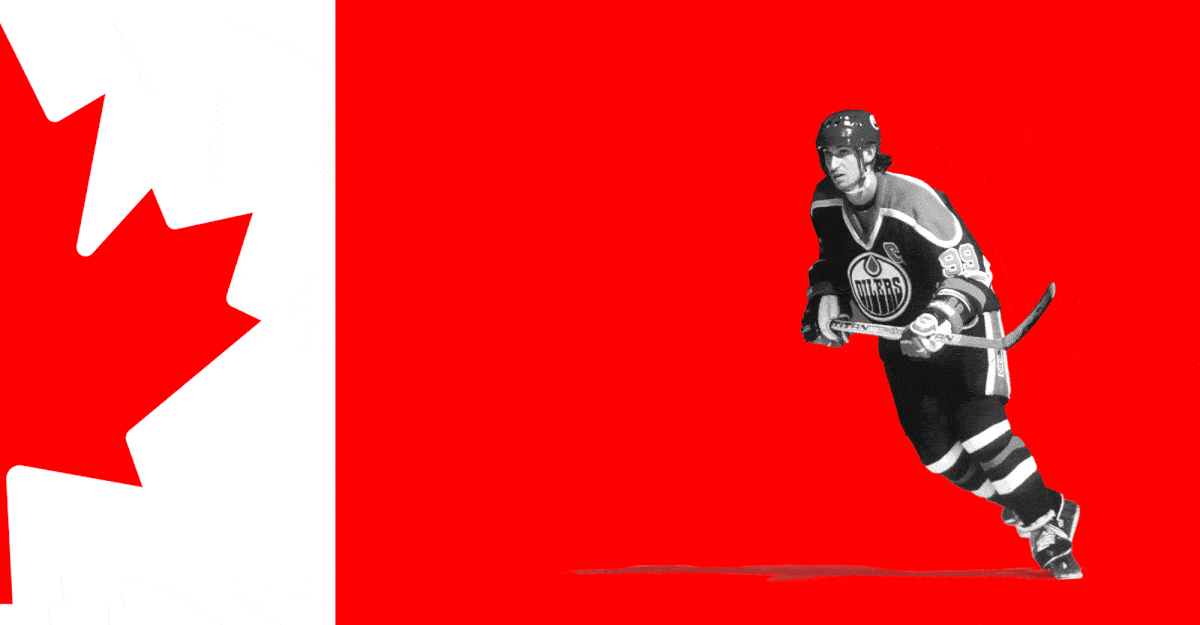In the summer of 1988, when I was 14 years old, I went camping with my family not far outside Toronto. We emerged from the woods and I wandered over to a newspaper box by the side of the road. Through its cracked glass, I saw a front-page picture of Wayne Gretzky, weeping. He’d been traded from the Edmonton Oilers to the Los Angeles Kings. I followed my idol’s lead and burst into tears.
Gretzky, back then at least, was more than a hockey player to Canadians. He was homegrown royalty, a player of such quality, of such rare possibility, that he transcended the game we’ve always used to define ourselves. I wasn’t even a true hockey kid, but I had Gretzky’s signature Titan stick, white with red lettering, and a pennant on my bedroom wall that memorialized his 1981–82 season, when he pocketed 92 goals and 120 assists for 212 points, all records. He went on to better that assists mark five times and reset his own points record with 215 in 1985–86. No one else has recorded more than 200 points in a season; he did four times, one for each Stanley Cup that he won. He retired in 1999 with 61 records, including the record for most records, and he still has more assists than anyone else has managed points. He changed hockey math, and with it our country’s measure of itself.
Today Gretzky surrendered one of his most cherished records—the most goals in an NHL career—to Alex Ovechkin, a 39-year-old Russian who plays for the Washington Capitals. Ovechkin scored his 895th goal, one better than Gretzky’s 894, in the second period against the Islanders in New York. He belly flopped onto the ice in ecstasy and relief before he was mobbed by his teammates, and then the game stopped to celebrate the greatest goal scorer who ever lived.
Gretzky, 64 years old and red-faced, was there to witness the occasion, the way Gordie Howe had encouraged Gretzky’s pursuit of his career-goals record. For more than a century, Canadians had taken turns eclipsing one another, a chain of succession that began with Joe Malone and included Howie Morenz and Maurice Richard, until Ovechkin overtook them all, claiming what Spencer Carbery, the Canadian-born coach of the Capitals, called “the greatest record in our sport.”
After Gretzky was traded to the Kings, his departure was cast as a mid-level national tragedy. “The biggest name in Canadian sports, the man hockey fans call the Great One, is going to the United States,” CBC anchor Knowlton Nash announced with a solemnity usually reserved for the deaths of princesses and declarations of war.
Not long ago, Canadians might have regarded the loss of Gretzky’s record with similar distress. Today they’re reacting with ambivalence. Some percentage of Canadians, including recent waves of Ukrainian refugees, will feel uneasy about the record belonging to Ovechkin, a vocal supporter of Vladimir Putin. But for many, the record had already slipped away—if not in 1988 then in 2025, when Donald Trump became the U.S. president again and Gretzky was there to cheer him on too.
Trump soon enraged Canadians with his “51st state” and “Governor Justin Trudeau” garbage, his trade war, and his open desire to annex our country. Anthem singers started getting earfuls at hockey games. Gretzky, who appears to have spent more time at Mar-a-Lago than in Canada lately, stayed a little too quiet about everything. When Canada and the U.S met in the final of the 4 Nations Face-Off in February, Gretzky was named our honorary captain and seemed reluctant to do it, without so much as a maple-leaf pin on his jacket lapel. After Canada won in overtime—I haven’t yelled at my TV like that in years—Gretzky gave the players red caps that said Be Great, a Trumpian echo that was either intentional or tone-deaf. He ended that debate on Friday night when he watched Ovechkin’s chase alongside Kash Patel, Trump’s FBI director. They sat together again this afternoon.
By then, Canadians were already calling Gretzky the “Great Once.” Someone smeared literal shit on his statue outside Edmonton’s Rogers Place; petitions were launched to rename the city’s Wayne Gretzky Drive and a parkway and arena in his hometown of Brantford, Ontario. Janet Gretzky, his American wife, came to his defense on Instagram: “I have never met anyone who is more Proud to be a Canadian, and it has broken his heart to read and see the mean comments,” she wrote. She deleted the post after other proud Canadians disputed her assessment.
Back in 1988, many of us in Canada blamed her for Gretzky’s exit. They had married weeks before the trade, a few months after her star turn in Police Academy 5: Assignment Miami Beach. Los Angeles must have been her idea, we assumed, a misogynist trope that survived even after it became obvious that Gretzky’s exile was self-imposed. We erected statues in his honor and named roads and arenas after him anyway. He went to St. Louis, to New York, to Phoenix, and somehow remained claimed by us. In 2009, we named him a Companion of the Order of Canada, our highest civilian honor, and ignored that he didn’t bother coming home to pick up his medal.
Now it’s time for hard truths. Gretzky has lived in the U.S. longer than he lived up here, in an American mansion with an American wife and American kids, palling around on American golf courses with an American president who says that Canada “only works as a state.” It might break Gretzky’s heart to hear it, but a lot of Canadians don’t think of him as one of us anymore. Once, we cried over where he played his hockey. His face could have been on our money, never mind his name on our sticks. But he’s made clear his choice, and so we’ve made ours. Wayne Gretzky’s records, like his faults, are singular. The loss is his and his alone.



